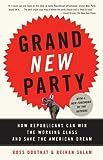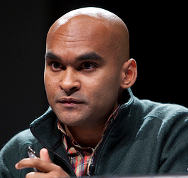Time Magazine has called living off the grid “one of the most important ideas of the next ten years.”
Time Managing Editor Richard Stengel, says of the article “this isn’t a matter of just scaling back but also of reconceiving how we live. “ Reihan Salam writes about how in the 2010s, more and more people will live off the grid, working in a new underground economy that will fill in the gaps of the old one. In a separate article in the special issue, Christopher Hayes writes passionately that “it’s not just the market that has changed. The entire edifice of trust in authority that supported American life has been shaken.
Time joined with the New America Foundation to assess the most important concepts that will shape our world over the next decade. The New America Foundation is an 11-year-old nonpartisan think tank in Washington with Silicon Valley roots, emphasizes next-generation thinkers and ideas.
 Salam, a policy adviser at the nonpartisan think tank e21, a blogger for the National Review and a columnist for Forbes.com.
Salam, a policy adviser at the nonpartisan think tank e21, a blogger for the National Review and a columnist for Forbes.com.
Article extract: “Imagine a future in which millions of families live off the grid, powering their homes and vehicles with dirt-cheap portable fuel cells,” Salam writes. “As industrial agriculture sputters under the strain of the spiraling costs of water, gasoline and fertilizer, networks of farmers using sophisticated techniques that combine cutting-edge green technologies with ancient Mayan know-how build an alternative food-distribution system. Faced with the burden of financing the decades-long retirement of aging boomers, many of the young embrace a new underground economy, a largely untaxed archipelago of communes, co-ops, and kibbutzim that passively resist the power of the granny state while building their own little utopias.
“Middle-class kids are taught from an early age that they should work hard and finish school. Yet 3 out of 10 students dropped out of high school as recently as 2006, and less than a third of young people have finished college. Many economists attribute the sluggish wage growth in the U.S. to educational stagnation, which is one reason politicians of every stripe call for doubling or tripling the number of college graduates.
But what if the millions of so-called dropouts are onto something? As conventional high schools and colleges prepare the next generation for jobs that won’t exist, we’re on the cusp of a dropout revolution, one that will spark an era of experimentation in new ways to learn and new ways to live.
It’s important to keep in mind that behavior that seems irrational from a middle-class perspective is perfectly rational in the face of straitened circumstances. People who feel obsolete in today’s information economy will be joined by millions more in the emerging post–information economy, in which routine professional work and even some high-end services will be more cheaply performed overseas or by machines. This doesn’t mean that work will vanish. It does mean, however, that it will take a new and unfamiliar form.
Look at the projections of fiscal doom emanating from the federal government, and consider the possibility that things could prove both worse and better. Worse because the jobless recovery we all expect could be severe enough to starve the New Deal social programs on which we base our life plans. Better because the millennial generation could prove to be more resilient and creative than its predecessors, abandoning old, familiar and broken institutions in favor of new, strange and flourishing ones.
Imagine a future in which millions of families live off the grid, powering their homes and vehicles with dirt-cheap portable fuel cells. As industrial agriculture sputters under the strain of the spiraling costs of water, gasoline and fertilizer, networks of farmers using sophisticated techniques that combine cutting-edge green technologies with ancient Mayan know-how build an alternative food-distribution system. Faced with the burden of financing the decades-long retirement of aging boomers, many of the young embrace a new underground economy, a largely untaxed archipelago of communes, co-ops, and kibbutzim that passively resist the power of the granny state while building their own little utopias.
Rather than warehouse their children in factory schools invented to instill obedience in the future mill workers of America, bourgeois rebels will educate their kids in virtual schools tailored to different learning styles. Whereas only 1.5 million children were homeschooled in 2007, we can expect the number to explode in future years as distance education blows past the traditional variety in cost and quality.
The cultural battle lines of our time, with red America pitted against blue, will be scrambled as Buddhist vegan militia members and evangelical anarchist squatters trade tips on how to build self-sufficient vertical farms from scrap-heap materials. To avoid the tax man, dozens if not hundreds of strongly encrypted digital currencies and barter schemes will crop up, leaving an underresourced IRS to play whack-a-mole with savvy libertarian “hacktivists.”
Work and life will be remixed, as old-style jobs, with long commutes and long hours spent staring at blinking computer screens, vanish thanks to ever increasing productivity levels. New jobs that we can scarcely imagine will take their place, only they’ll tend to be home-based, thus restoring life to bedroom suburbs that today are ghost towns from 9 to 5. Private homes will increasingly give way to cohousing communities, in which singles and nuclear families will build makeshift kinship networks in shared kitchens and common areas and on neighborhood-watch duty. Gated communities will grow larger and more elaborate, effectively seceding from their municipalities and pursuing their own visions of the good life. Whether this future sounds like a nightmare or a dream come true, it’s coming.
This transformation will be not so much political as antipolitical. The decision to turn away from broken and brittle institutions, like conventional schools and conventional jobs, will represent a turn toward what military theorist John Robb calls “resilient communities,” which aspire to self-sufficiency and independence. The left will return to its roots as the champion of mutual aid, cooperative living and what you might call “broadband socialism,” in which local governments take on the task of building high-tech infrastructure owned by the entire community. Assuming today’s libertarian revival endures, it’s easy to imagine the right defending the prerogatives of state and local governments and also of private citizens–including the weird ones. This new individualism on the left and the right will begin in the spirit of cynicism and distrust that we see now, the sense that we as a society are incapable of solving pressing problems. It will evolve into a new confidence that citizens working in common can change their lives and in doing so can change the world around them.
We see this individualism in the rise of “freeganism” and in the small but growing handful of “cage-free families” who’ve abandoned their suburban idylls for life on the open road. We also see it in the rising number of high school seniors who take a gap year before college. While the higher-education industry continues to agitate for college for all, many young adults are stubbornly resistant, perhaps because they recognize that for a lot of them, college is an overpriced status marker and little else. In the wake of the downturn, household formation has slowed down. More than one-third of workers under 35 live with their parents.
The hope is that these young people will eventually leave the house when the economy perks up, and doubtless many will. Others, however, will choose to root themselves in their neighborhoods and use social media to create relationships that sustain them as they craft alternatives to the rat race. Somewhere in the suburbs there is an unemployed 23-year-old who is plotting a cultural insurrection, one that will resonate with existing demographic, cultural and economic trends so powerfully that it will knock American society off its axis.

4 Responses
Here in New Zealand empty spaces in cities and suburbs are being taken over by keen groups of volunteers who plant fruit and nut trees on them. These fruit from these trees can be taken by anyone who cares to pick it! Our local council’s have gotten keen too and are even planting some of their own initiative! Some friends and I managed to get a council grant for 27 fruit and nut trees for our local play ground/sports ground. They are just over a year old now and looking great. How many public parks, play grounds and road verges are there out there that could be planted with edibles too large to fit in your yard (or no yard)? Talk to your local council or school. If they are unreasonable, there’s always guerilla planting (sneaking out in the middle of the night and planting one anyway)!
If you happened to read Daemon & its sequel, Freedom by Daniel Suarez, this is the same sort of thing that he envisions. This human machine shop needs to stop at some point sooner rather than later.
This article makes total sense. The values of life are eroding very quickly that we need a huge paradigm shift.
This article makes more sense than people realize. We have an ever growing amount of people living off the grid now, and because of the financial and political climate that number is about to increase by leaps and bounds. We have a system that is broken in this country and many are tired of trying to use due process to repair it. This is not a left ir right problem. This is a power[greed]problem that has effected both sides A large number of citizens are starting to wake up an realize it. Alternative life styles will be the answer for many. Off the grid sounds appealing as an alternative. However, the Gov’t will eventually see what is happening and find a way to capitalize. They always do.
There were moves in this direction in the late 19th and early 20th century, housing co-ownership, garden cities and villages, some of which still existin the UK, “Google” Ebenezer Howard. Unfortunately, ww1 put a stop to further development and the self self culture of owner occupation came along……